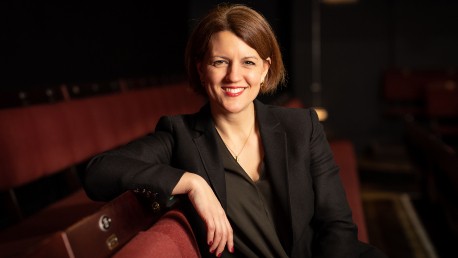
Funding in the arts: In conversation with the Donmar
01 December 2022
As the arts sector adjusts to a post-pandemic reality, many organisations have had to re-evaluate the ways in which they secure the funding needed to engage with their communities.
Fortunately, philanthropists can play a central role in helping creative bodies to deliver both their artistic vision and social outreach initiatives.
Juliet Agnew, our Head of Philanthropy, spoke to the Donmar Warehouse’s Executive Director Henny Finch, and Director of Participation Phil McCormack, about their work to inspire the next generation of artists.
Juliet Agnew (JA): Thank you for speaking to us. Perhaps I can start by asking you about the Donmar and its priorities? And crucially, what gives you the biggest joy in your roles?
Henny Finch (HF): For us, creating great theatre and improving accessibility will always be top priorities. We achieve this by staging productions that inspire audiences and by charging affordable prices – a tricky balance to strike, especially in today’s climate.
Phil McCormack (PM): We also have another equally important priority, which is engaging with communities. We want to ensure the relevance of theatre and to create productions that reflect the diverse populations in which we live.
HF: Personally, I get most joy from working with first-class artists who come together to create something that you couldn’t replicate in another setting.
PM: For me, the joy comes from seeing young people have ownership over our space and them knowing they can make an impact. The Donmar is behind two small doors in Covent Garden, but when you go through these doors, you can be transformed by incredible stories from around the world.
JA: I love that door analogy, thank you! Phil, you just spoke about your desire to engage communities, and so can you please give us some more insight into the Donmar’s work with schools and young people?
HF: Towards the end of the pandemic, we took a show into schools. Many of those kids wouldn’t have been to the theatre before. It’s electric to be surrounded by young people and watch them interact with one of our performances, and we’re going to do more of that next year.
PM: We also work intensively with young people so they can build a lifelong interest in theatre, and our goal is to be a changemaker in the sector, essentially by delivering excellent work on the stage, and combining it our involvement with communities.
JA: Why is it so important that we get more young people excited about the arts?
PM: A huge question but a crucial one. When we reopened after lockdown, it was a reminder that the theatre is an act of community. You’re sitting with strangers, but you share these intense moments of connection. We’re trying to bring theatre to young people or bring them to us, so that we can create as many opportunities as possible for them to have these moments of magic.
HF: It’s also about overcoming the social isolation that began during the pandemic, and empowering young people to feel that they’re entitled to be in a theatre like ours, and to speak articulately about what they’ve seen.
JA: Despite recent progress, do you think there’s still a misconception that the arts are the domain of an intellectual elite?
PM: It’s becoming less elite because young people can use art to articulate their experience of the world and they are so much more politically engaged than previous generations.
The challenge is that arts funding is being cut in schools, and there is a risk of elitism if funds disappear from state schools.
HF: Societally, arts tend to be put in a silo. If you think of everything we consume through streaming services and video games, these things are also art. If you say there is a theatre and high art over here and TV and football over there, that’s missing the point. It’s the same flow of talent.
JA: And given some of the challenges you’ve alluded to, how are you working to overcome barriers for inclusion?
PM: We need to think about all the different barriers. Some can be financial, but we should also consider what representation looks like and which artists should work with specific groups. We do a lot of work around inclusivity to make sure the right people are sharing their lived experiences.
HF: And as an extension, that’s also why affordable pricing strategies are hugely important in helping us maintain accessibility.
JA: How have you adapted your fundraising efforts in the aftermath of the pandemic?
HF: Many of our funders were loyal to us during the pandemic. It was important to meaningfully thank those supporters and we’ve had to devise different ways of doing that.
Before COVID-19, we entertained large groups at the theatre, but now we do more online because so many people are working from home.
JA: Has the role of philanthropists changed? And is it harder to attract donations, especially given the current environment?
HF: Undeniably, the fundraising environment is becoming more competitive and we’re reaching out to private donors more often. Without them, our efforts to develop talent and take creative risks are hindered.
I’m sure lots of organisations are in the same position because of rising costs and falling subsidies, but there shouldn’t ideally be competition between arts organisations as we’re all working towards the same goal.
It’s ultimately about evolution and agility. Throughout the pandemic, we showed how entrepreneurial we can be. We were the first theatre in London to reopen during August 2020 and the following year, we produced a play in the West End on a COVID-proof basis.
JA: That tale of needing to adapt is one being told far and wide across the arts space today, and I’m sure will continue into next year and beyond. One final question if I may – in brief, what are your hopes for 2023?
HF: Three things for me: A short recession, the end of COVID and that our shows inspire people.
PM: And two things for me: It’s to keep finding stories that urgently need to be told from within our communities, and discovering the young talent who will be making great art in 10 or 15 years.
Guest biographies:

Henny Finch is Executive Director of the Donmar Warehouse. Previously she has held the same role at Headlong Theatre (which she founded with Rupert Goold) and at international dance company Hofesh Shechter Company. She has lead produced dance and theatre shows all over the world, working in subsidised London and UK regional theatres, major opera and dance houses, leading international festivals, in the West End and on Broadway.

Phil McCormack is the Director of Participation at the Donmar Warehouse, leading on their schools, community and talent development programmes. Recent work includes THE TRIALS, TEENAGE DICK SCHOOLS TOUR, ASSEMBLY and MONUMENTS. Prior to the Donmar, Phil was a freelance director, leading on large-scale mainstage and community work across the UK.
Related articles
This communication is general in nature and provided for information/educational purposes only. It does not take into account any specific investment objectives, the financial situation or particular needs of any particular person. It not intended for distribution, publication, or use in any jurisdiction where such distribution, publication, or use would be unlawful, nor is it aimed at any person or entity to whom it would be unlawful for them to access.
This communication has been prepared by Barclays Private Bank (Barclays) and references to Barclays includes any entity within the Barclays group of companies.
This communication:
- is not research nor a product of the Barclays Research department. Any views expressed in these materials may differ from those of the Barclays Research department. All opinions and estimates are given as of the date of the materials and are subject to change. Barclays is not obliged to inform recipients of these materials of any change to such opinions or estimates;
- is not an offer, an invitation or a recommendation to enter into any product or service and does not constitute a solicitation to buy or sell securities, investment advice or a personal recommendation;
- is confidential and no part may be reproduced, distributed or transmitted without the prior written permission of Barclays; and
- has not been reviewed or approved by any regulatory authority.
Any past or simulated past performance including back-testing, modelling or scenario analysis, or future projections contained in this communication is no indication as to future performance. No representation is made as to the accuracy of the assumptions made in this communication, or completeness of, any modelling, scenario analysis or back-testing. The value of any investment may also fluctuate as a result of market changes.
Where information in this communication has been obtained from third party sources, we believe those sources to be reliable but we do not guarantee the information’s accuracy and you should note that it may be incomplete or condensed.
Neither Barclays nor any of its directors, officers, employees, representatives or agents, accepts any liability whatsoever for any direct, indirect or consequential losses (in contract, tort or otherwise) arising from the use of this communication or its contents or reliance on the information contained herein, except to the extent this would be prohibited by law or regulation.